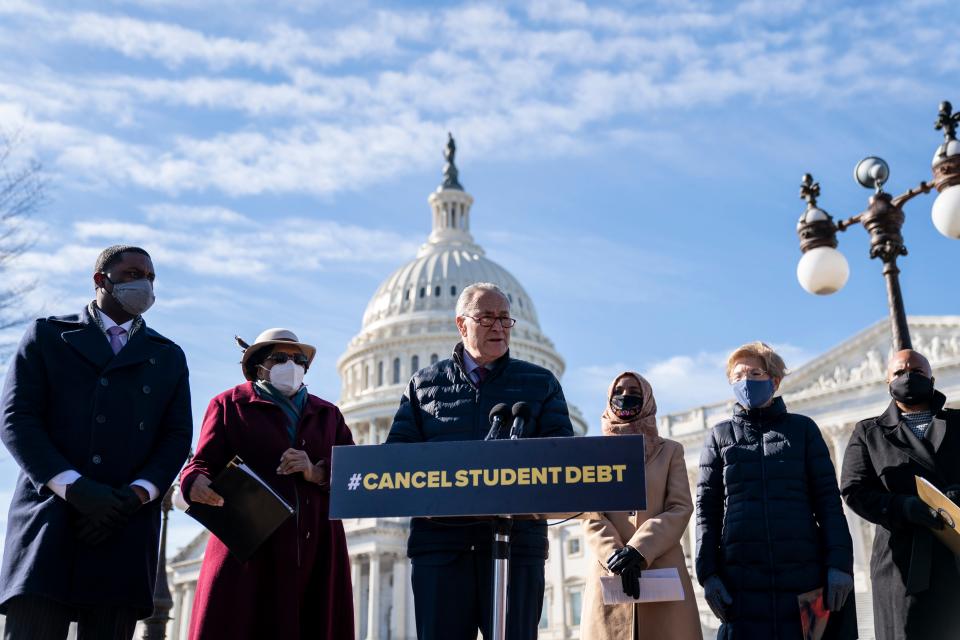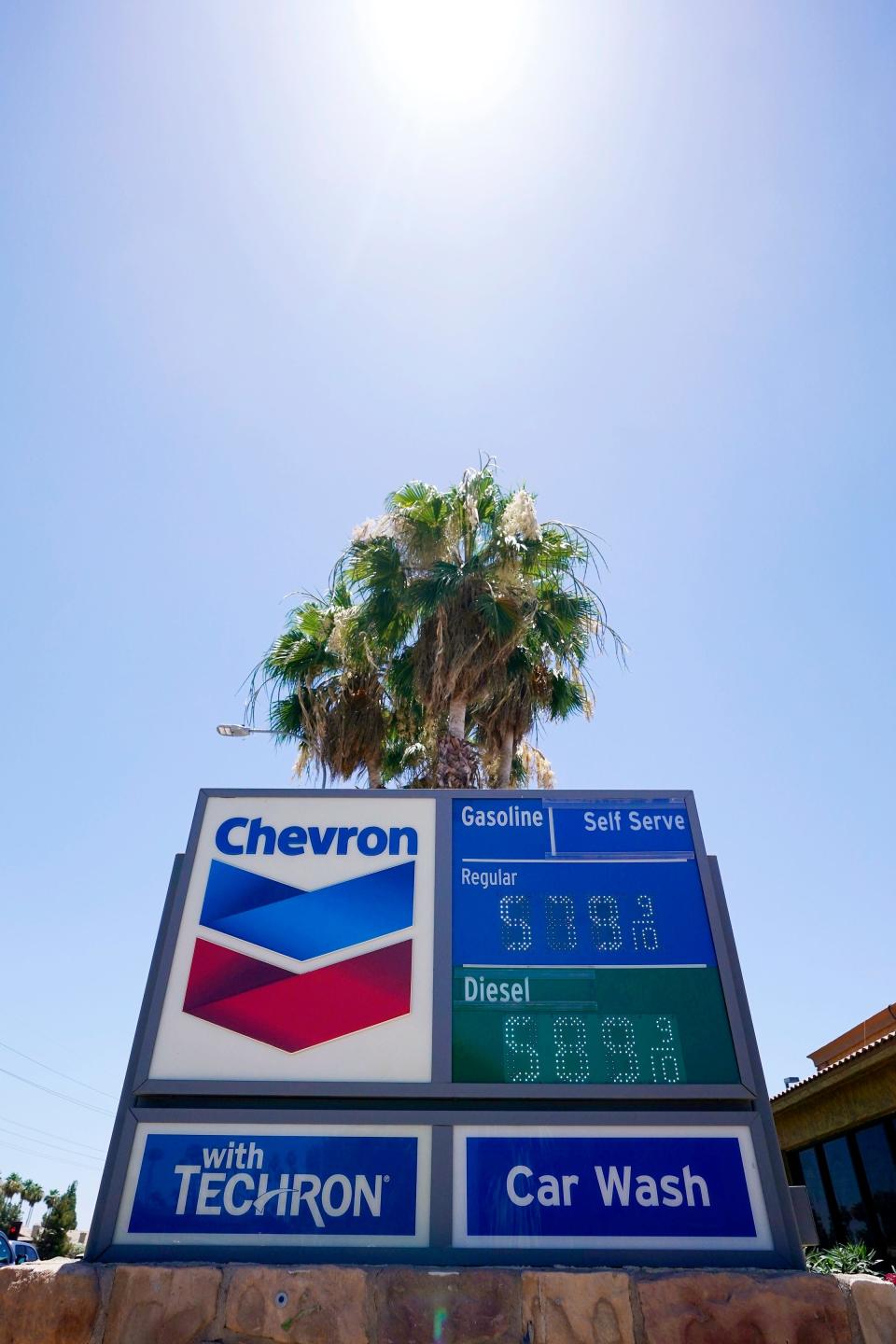How soaring inflation is complicating Biden's decision whether to forgive student loan debt
- Oops!Something went wrong.Please try again later.
- Oops!Something went wrong.Please try again later.
WASHINGTON – In April, President Joe Biden said he was taking a "hard look" at executive action to forgive federal student loan debt and would "have an answer" in a couple of weeks.
But six weeks later, the president hasn't made a decision as the push has collided with the politics of 40-year-high-inflation in a midterm election year.
Biden faces increasing pressure from progressive Democrats to cancel a substantial portion of debt for Americans who took federal loans to pay for college. The president has also called fighting inflation his "top domestic issue" as soaring consumer prices and surging fuel costs consume his presidency.
Canceling potentially up to $10,000 in student loan debt would mean billions more collectively staying in the pockets of Americans. Some critics argue the extra money for consumers to spend risks stoking demand while supply chains remain bottled, further accelerating historic inflation.
Biden hints at action: President taking 'hard look' at student loan debt forgiveness, but less than $50,000
$5 a gallon for gas?: Prices at the pump reach new high for nationwide average, AAA says
Publicly, the White House has said any impact on inflation would be small. But inflation considerations are nonetheless going "into the calculus," said a senior White House official, speaking on condition of anonymity. Even announcing a plan could hand Republicans a new line of attack as they blame higher consumer prices on Biden's economic policies.
For the first time, the national average for a gallon of gasoline surged above $5 on Saturday, according to AAA. The Consumer Price Index increased 8.6% annually in May, the largest rise since December 1981, the Labor Department said Friday. Economists had predicted inflation would hold steady at 8.3%.
"Inflation is the bane of our existence," Biden said Wednesday on ABC's "Jimmy Kimmel Live!"

A final call on student loan forgiveness from Biden isn't expected until later this summer.
Several top Democrats, including Majority Leader Chuck Schumer, D-N.Y., and Sen. Elizabeth Warren, D-Mass., have lobbied Biden to cancel at least $50,000 in student loan debt. The president has said he's unwilling to go that high. The Washington Post reported the White House is eyeing a plan that would cancel up to $10,000 in student loan debt per borrower – a figure Biden campaigned on – for Americans who earned less than $150,000 the previous year, or $300,000 for married couples filing jointly.
"We're going to get there. I'm confident," said Rep. Joyce Beatty, D-Ohio, chairwoman of the Congressional Black Caucus, whose members met June 3 with White House staff to make their case for debt forgiveness.
Beatty said she couldn't speak for the White House about whether inflation is holding back a decision but argued the rising costs are another reason for the president to "reduce the costs" for borrowers.
"People are hurting, and people are coming to us and to the administration that this is an immediate crisis," she told USA TODAY.
Debt forgiveness could mean end of mortarium on loan repayments
The logistical challenge of implementing a debt forgiveness program on a national scale based on income is an additional hurdle. The Department of Education has limited access to the earnings of borrowers, meaning Americans who took out loans would have to prove their eligibility. Still, Education Secretary Miguel Cardona told reporters this month his department is "ready to move forward" when Biden makes a decision.
More than 43 million people have federal student loan debt in the U.S., and the average borrower has about $37,000, according to data compiled by the Education Data Initiative. The outstanding federal loan balance is about $1.6 trillion.
Brian Deese, director of the National Economic Council, said the economic effect of any student debt forgiveness plan would occur over "years or a couple of decades," not immediately.
"And so, the impact on inflation in the near term is likely to be quite small," Deese said.
More: Free college or federal student loans? These alternatives could help solve student debt crisis
But given the uncertainty around inflation – and the toll it has already taken on Biden's presidency – the White House is exercising caution and exploring how any action could play out before the November midterm elections.
"The impact of this on inflation is certainly going to go into the calculus," a senior White House official said. Despite forecasting a "negligible" effect, the official added: "On any major decision – and I think this would qualify as a major decision – you need to look at the potential political impact and the potential economic impact."
One reason for the White House's confidence that forgiving some student loan debt wouldn't drive up inflation further: The White House has assumed any debt forgiveness plan would coincide with the end of a moratorium on all student loan repayments, set to expire Aug. 31, that Biden has extended multiple times during the pandemic.
The federal government typically takes in about $6 billion a month from student loan repayments, but payments from borrowers have lowered to about $2 billion during the freeze.
The resumption of loan repayments, even with cancellations up to $10,000 per eligible borrower, would have a "deflationary" effect, according to the same White House official. The official acknowledged a "wealth effect" in which Americans no longer burdened by concerns about monthly loan repayments could spend that money on goods or travel, but the official said that's not enough to spike inflation.

Other economists have sounded the alarm, however. Larry Summers, a former treasury secretary in the Clinton administration, wrote after Biden's most recent move in April to extend the moratorium: "Wherever one stands on student debt relief this approach is regressive, uncertainty creating, untargeted and inappropriate at a time when the economy is overheated."
"This is not a small macroeconomic thing," added Summers, who has been an outspoken critic of the inflationary effect of Biden's $1.9 trillion COVID-19 rescue plan that Congress passed in 2021.
More: Another record month for inflation: New level driven by gas, grocery prices and high rent
The Committee for a Responsible Federal Budget, a nonprofit that analyzes fiscal impacts of policies, estimated that canceling $10,000 in student debt for households that earn less than $300,000 would cost the federal government $230 billion.
"Even a modest increase in inflationary pressures could feed into current inflation dynamics, increasing the risk of a wage-price spiral and making it harder for the Federal Reserve to re-anchor inflation expectations," the organization said.
Political pros and cons before midterms
Soaring inflation has produced major headwinds for Democrats and Biden seeking to keep control of Congress in the midterm elections, and a toxic situation for the president, whose approval ratings have dropped to new lows below 40%.
Even before Biden rolls out a potential debt forgiveness plan, Republicans have lashed out at the idea, saying it would transfer wealth to college-educated elites from those without college degrees and would penalize families who saved up for college instead of taking on debt.
They've also set out to tie forgiving student loan debt with anxieties about rising consumer prices.
Sen. Ted Cruz, R-Texas, in a June 5 tweet responding to a potential student debt cancellation from the president, said it "will drive inflation even higher." Sen. Tom Cotton, R-Ark, said on Twitter: "If Joe Biden really wanted to fight inflation, he would cancel his plan to give $10,000 taxpayer-funded checks to wealthy doctors and lawyers as student loan forgiveness."

'Windfall for the rich': Republicans warm up attacks as Biden weighs forgiving student debt
Poll: Young people want student debt relief. But not all want it totally canceled
Canceling some student loan debt – an idea wildly popular among young voters who lean to the left – could energize progressive voters who have shown signs of being unenthused in the November elections.
But David Cohen, a political scientist at the University of Akron, said canceling $10,000 in loan debt isn't likely enough to excite the Democratic base during the election. He predicted Biden will ultimately punt a decision until after the November elections.
"Politically, that's the smartest move to take," Cohen said, adding that the White House could extend the freeze on loan payments and delay a decision on student debt forgiveness until inflation settles. "And it wouldn't give Republicans ammunition before the midterms."
Conversely, Republican pollster Frank Luntz said that voters are not likely to draw a correlation between forgiving student debt and inflation. Instead, he said the bigger risk would be upsetting voters who worked to pay off their loans.
"Make no mistake, you cut college debt and individuals in their 20s will reward Biden in record numbers," Luntz said. "It's just that the other people who paid off their debt will be really angry."
The Department of Education has approved $25 billion in loan forgiveness for 1.3 million borrowers through existing federal program since Biden took office. The Congressional Black Caucus has framed its push for more relief as a "racial and economic justice issue," noting that Black college graduates on average owe significantly more in debt than their white peers after college.
"It's complicated," Beatty said. "This is a crisis, and so we're going to get it right."
Reach Joey Garrison @joeygarrison.
This article originally appeared on USA TODAY: High inflation complicates Biden's student loan forgiveness hopes

